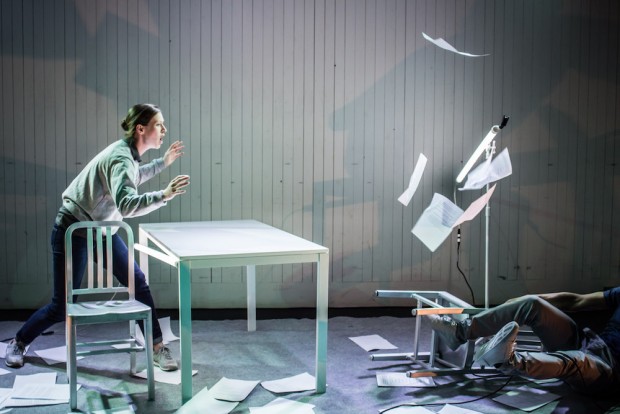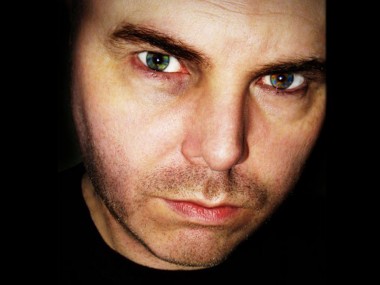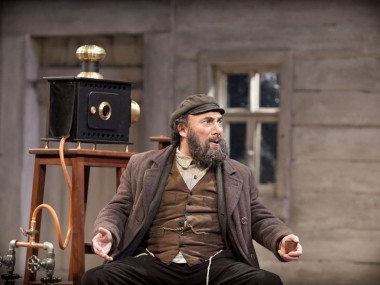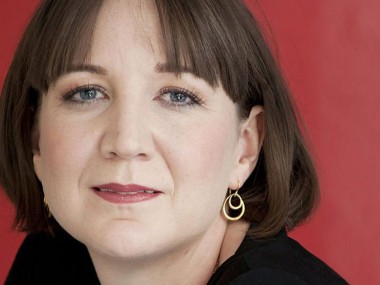Heather, Bush Theatre
Thursday 2nd November 2017

Harry Potter has a lot to answer for. The phenomenal success of JK Rowling’s books, and of their film versions, and of the stage play Harry Potter and the Cursed Child (now set to remain in the West End for all eternity), has created a template of extravagant cultural impact that must still be bewitching prospective authors of the next big thing, as well as their prospective publishers and prospective readers. The HP phenomenon also provides plenty of material for satire. Step forward Thomas Eccleshare, whose short but fascinating new two-hander arrived at the Bush Theatre tonight.
Although it’s only 55 minutes long, Heather tells a compelling story. It starts innocently enough with an email exchange between Harry (or should that be Hari?), a publisher of children’s fiction, and Heather Eames, a reclusive author who is seeking a book deal for her first fantasy novel, Greta and the Pen of the Necromancer (yes, the spirit of Philip Ridley hangs over some parts of the evening). As editorial comments and responses about the book go to and fro, and contracts are exchanged, the novel is launched into the public realm with a fair dollop of the usual hype. And it works! Greta’s fictional story becomes an amazing success, a publishing phenomenon. A film, a sequel, a sensation. A world event.
But one problem emerges. Heather won’t do interviews in person, or appear at book launches. Despite Harry’s increasingly desperate pleas, she won’t budge. This, it must be said, doesn’t affect the books’ popularity, but in a media-saturated age it is a bit unusual. You can probably guess why Heather doesn’t want to appear in public, and it would be a terrific spoiler if I told you, so I won’t. But suffice to say that as well as being a satire on the Harry Potter phenomenon, this play is an examination of authorial identity and of the great expectations of readers. After all, didn’t JK Rowling use initials in front of her surname because her publisher thought that books by women wouldn’t sell well to boys?
Of course, Eccleshare injects a good shot of exaggeration into his subversion of our image of the typical children’s book author, and then plays merry havoc with lots of ideas about the relationship between fiction and real life. After the opening email exchange, which involves the two actors — Ashley Gerlach and Charlotte Melia — standing in front of microphones, dropping the pages of their correspondence onto the floor, there are two other sections: one is a fraught meeting between the publisher and the author. And the other is the re-enactment of the film version of the thrilling final scene of the Greta book series.
Along the way, several questions about fiction raise their magical heads, and nod towards the audience: does it matter who has written a book, if the book is popular? Does a children’s book craze require the author to be a white, young woman, preferably blonde and well-schooled? When do fictional characters take on a life of their own? The answers given here have a nice tang of disagreeable truth: this is a play as much about prejudice as about creativity. What do our expectations about a book’s author tell us about ourselves? Like an episode of the BBC’s Moral Maze, Heather turns over a series of ethical problems and gives them a good dusting down.
The writing is fluent, imaginative and, as far as it goes, bursting with resonance. But then so is the staging. Director Valentina Ceschi, for Dancing Brick, and designer Lily Arnold — in a coproduction with the Tobacco Factory — create a whole world from two microphone stands, a table, some chairs and a couple of neon rods (a must-have accessory these days). Gerlach and Melia adopt a detached and deliberately affectless delivery in one scene, and a heightened fantasy style in another, both equally effective. Ian Armstrong’s music helps the parodic intent of the play, at one point electrifying the emotions. If Heather is a rather tricksy and slight piece of theatre, more a short story than a novel, it is one with the power to burn bright in your imagination.
This review first appeared on The Arts Desk




